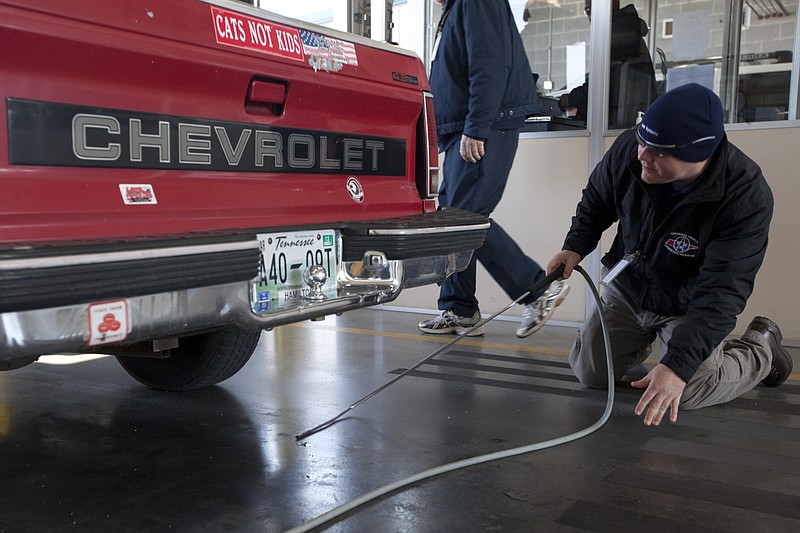NASHVILLE - A bill that attempts to end mandatory vehicle emissions testing in Hamilton and five other Tennessee counties is scheduled for a final floor vote this afternoon in the state Senate.
But while the bill is expected to pass, its stated goal of halting emissions testing on cars and trucks won't happen overnight.
In fact, it could take three or more years to develop alternatives to the testing program, used to lower air pollution, and also take them to federal regulators and win approval there, according to a Tennessee Department of Environment and Conservation official.
Final say-so will have to come from the U.S. Environmental Protection Agency, which calls the shots on federal Clean Air Act requirements and the steps needed to cut air pollution levels and ensure continued compliance with air quality standards.
"The bill ends the inspection and maintenance [emissions testing] program in Tennessee if EPA approves," said Kim Schofinski, a spokeswoman with TDEC, in an email response to Times Free Press inquiries.
She noted TDEC still continues to work on submitting another plan to EPA, based on a 2016 law passed by state lawmakers that sought to exempt new vehicles from the emissions testing.
"TDEC will broaden the scope of its current analysis regarding the impact of legislation enacted by the General Assembly previously to exempt three years or newer motor vehicles on air quality," Schofinski said. "We anticipate that this analysis should take six months to a year. The steps to be taken after that will be determined by the results of the analysis."
The "total process to obtain EPA approval could take three years or more depending on many variables, including the speed of federal action," Schofinski added. "Substitute measures will need to be taken if the analysis demonstrates that the elimination of emissions testing will interfere with air quality."
Two Hamilton County lawmakers who are leading the charge to end vehicle emissions testing say they remain confident that TDEC and local officials will be able to develop less intrusive alternatives to vehicle testing if that step becomes necessary.
Sen. Bo Watson, R-Hixson, and Rep. Mike Carter, R-Ooltewah, say they believe Hamilton, Davidson, Rutherford, Sumner, Williamson and Wilson counties can follow paths blazed by Shelby County to get out of its emissions testing program. Knox County avoided it entirely by restricting truck speeds in a broad area.
Still, Watson said, "I don't want to mislead the public. You know, it doesn't happen immediately. There are some contractual things that have to be worked out. I mean, 2019 would be the first time it could actually be repealed or eliminated."
Moreover, Watson added, "full disclosure and transparency: That's contingent on TDEC working with locals working with EPA to come up with a replacement program. So that's why I've said this is a repeal and replace [bill]. We're repealing [testing], but we got to be able to replace it with something. We've understood that all along."
Watson and Carter filed the bill this year after TDEC officials announced last summer that all of Tennessee's 95 counties are now fully compliant, or in EPA jargon in "100 percent attainment," on federal ambient air quality requirements for ozone and particulate matter.
Hamilton, Davidson, Rutherford, Sumner, Williamson and Wilson counties all have EPA-approved vehicle emissions testing programs they have used to lower emissions as the state sought to meet federal Clean Air Act provisions mandating safer air quality.
Locally, Hamilton County officials initiated the testing program in 2005 to ensure pollution wouldn't be a problem as the community sought to develop the county's Enterprise South industrial park and lure a major manufacturer to the site. In 2007, Volkswagen located its lone U.S. auto assembly plant there.
Local officials, as well as TDEC Commissioner Bob Martineau, raised concerns about the bill initially.
"I think they are to the point they understand we have to look at some other options to replace it," Watson said. "And obviously, we're going to ask them to look at options that are the least intrusive, the least objectionable that we can find."
He noted "we've done a great job in Hamilton County, obviously, in cleaning up our environment. And no one wants to change that."
Efforts on Friday to reach Bob Colby, director of the Chattanooga-Hamilton County Air Pollution Control Bureau, were unsuccessful.
It's not immediately clear what impact the Tennessee Valley Authority's move to shut down three of its coal-fired power generating plants in Tennessee and Alabama since 2005 will have. The plants were major polluters.
Watson said that of all the issues he's dealt with since being elected in the early 2000s, "I would argue that I get more emails and phone calls and letters about this issue than anything. And it's usually from people saying, 'I can't get my car to pass and I don't have $600 to fix it.'"
"Our argument is this kind of hurts people who can least afford it," he added.
Seniors and others have complained to the Times Free Press that addressing a check-engine light issue, an automatic failure in the programs, can cost hundreds of dollars, sometimes more. And many dislike testing center lines as well as the $9 fee.
Hamilton County Clerk Bill Knowles' office issues license tags for vehicles that the state says must pass emissions tests before a tag can bought or renewed.
On the office's website, Knowles has posted a notice in response to many inquiries he's gotten about the legislation.
"Emission testing remains in effect prior to titling or renewing a vehicle registration until repeal is approved by the United States Environment Protection Agency (EPA)," the notice says. "When approval is granted Hamilton County government will be notified. Updates will be posted as they become available."
Knowles said in an interview his office is required under state law to ensure vehicle owners have the required proof of passing emissions testing before issuing tags.
Over the years, Knowles said, he's heard heartbreaking stories from people who "tell me they can't afford to fix their vehicle." While sympathetic, he said, "I have nothing to do with it. It's an air pollution program."
He said he posted the website caution to visitors who are calling to see if they still need to have their vehicles tested now.
The bill would require the state to end a state testing contract for Hamilton, Rutherford, Sumner, Williamson and Wilson counties in 2019 unless the EPA has not acted.
Davidson County has its own contract which expires in 2021, Watson recalled.
The bill would do away with the $9 testing fee, most of which now goes to the state to pay for the five-county emissions testing contract. But in order to avoid getting slapped with an expenses analysis that might have made the bill harder to pass, it includes a provision allowing county commissions vote to keep a $4 fee on title and tag issuance. Of that, $3 would go into the county's general fund and $1 to county clerks.
Contact Andy Sher at asher@timesfreepress.com or 615-255-0550. Follow on Twitter @AndySher1.

